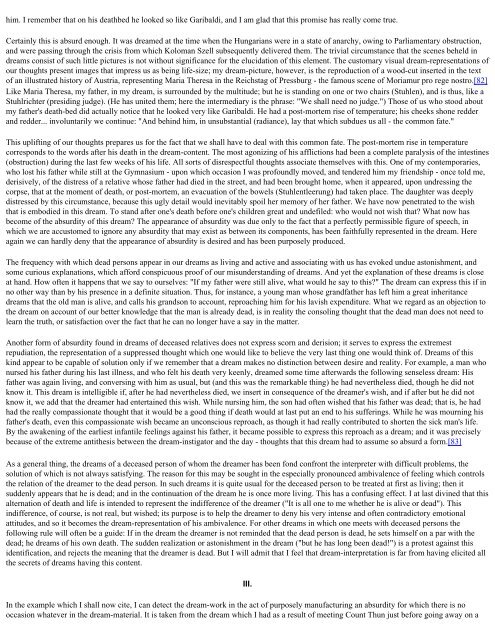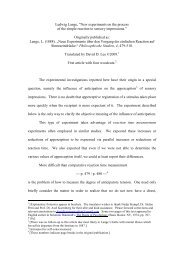The Interpretation Of Dreams Sigmund Freud (1900) PREFACE
The Interpretation Of Dreams Sigmund Freud (1900) PREFACE
The Interpretation Of Dreams Sigmund Freud (1900) PREFACE
Create successful ePaper yourself
Turn your PDF publications into a flip-book with our unique Google optimized e-Paper software.
him. I remember that on his deathbed he looked so like Garibaldi, and I am glad that this promise has really come true.<br />
Certainly this is absurd enough. It was dreamed at the time when the Hungarians were in a state of anarchy, owing to Parliamentary obstruction,<br />
and were passing through the crisis from which Koloman Szell subsequently delivered them. <strong>The</strong> trivial circumstance that the scenes beheld in<br />
dreams consist of such little pictures is not without significance for the elucidation of this element. <strong>The</strong> customary visual dream-representations of<br />
our thoughts present images that impress us as being life-size; my dream-picture, however, is the reproduction of a wood-cut inserted in the text<br />
of an illustrated history of Austria, representing Maria <strong>The</strong>resa in the Reichstag of Pressburg - the famous scene of Moriamur pro rege nostro.[82]<br />
Like Maria <strong>The</strong>resa, my father, in my dream, is surrounded by the multitude; but he is standing on one or two chairs (Stuhlen), and is thus, like a<br />
Stuhlrichter (presiding judge). (He has united them; here the intermediary is the phrase: "We shall need no judge.") Those of us who stood about<br />
my father's death-bed did actually notice that he looked very like Garibaldi. He had a post-mortem rise of temperature; his cheeks shone redder<br />
and redder... involuntarily we continue: "And behind him, in unsubstantial (radiance), lay that which subdues us all - the common fate."<br />
This uplifting of our thoughts prepares us for the fact that we shall have to deal with this common fate. <strong>The</strong> post-mortem rise in temperature<br />
corresponds to the words after his death in the dream-content. <strong>The</strong> most agonizing of his afflictions had been a complete paralysis of the intestines<br />
(obstruction) during the last few weeks of his life. All sorts of disrespectful thoughts associate themselves with this. One of my contemporaries,<br />
who lost his father while still at the Gymnasium - upon which occasion I was profoundly moved, and tendered him my friendship - once told me,<br />
derisively, of the distress of a relative whose father had died in the street, and had been brought home, when it appeared, upon undressing the<br />
corpse, that at the moment of death, or post-mortem, an evacuation of the bowels (Stuhlentleerung) had taken place. <strong>The</strong> daughter was deeply<br />
distressed by this circumstance, because this ugly detail would inevitably spoil her memory of her father. We have now penetrated to the wish<br />
that is embodied in this dream. To stand after one's death before one's children great and undefiled: who would not wish that? What now has<br />
become of the absurdity of this dream? <strong>The</strong> appearance of absurdity was due only to the fact that a perfectly permissible figure of speech, in<br />
which we are accustomed to ignore any absurdity that may exist as between its components, has been faithfully represented in the dream. Here<br />
again we can hardly deny that the appearance of absurdity is desired and has been purposely produced.<br />
<strong>The</strong> frequency with which dead persons appear in our dreams as living and active and associating with us has evoked undue astonishment, and<br />
some curious explanations, which afford conspicuous proof of our misunderstanding of dreams. And yet the explanation of these dreams is close<br />
at hand. How often it happens that we say to ourselves: "If my father were still alive, what would he say to this?" <strong>The</strong> dream can express this if in<br />
no other way than by his presence in a definite situation. Thus, for instance, a young man whose grandfather has left him a great inheritance<br />
dreams that the old man is alive, and calls his grandson to account, reproaching him for his lavish expenditure. What we regard as an objection to<br />
the dream on account of our better knowledge that the man is already dead, is in reality the consoling thought that the dead man does not need to<br />
learn the truth, or satisfaction over the fact that he can no longer have a say in the matter.<br />
Another form of absurdity found in dreams of deceased relatives does not express scorn and derision; it serves to express the extremest<br />
repudiation, the representation of a suppressed thought which one would like to believe the very last thing one would think of. <strong>Dreams</strong> of this<br />
kind appear to be capable of solution only if we remember that a dream makes no distinction between desire and reality. For example, a man who<br />
nursed his father during his last illness, and who felt his death very keenly, dreamed some time afterwards the following senseless dream: His<br />
father was again living, and conversing with him as usual, but (and this was the remarkable thing) he had nevertheless died, though he did not<br />
know it. This dream is intelligible if, after he had nevertheless died, we insert in consequence of the dreamer's wish, and if after but he did not<br />
know it, we add that the dreamer had entertained this wish. While nursing him, the son had often wished that his father was dead; that is, he had<br />
had the really compassionate thought that it would be a good thing if death would at last put an end to his sufferings. While he was mourning his<br />
father's death, even this compassionate wish became an unconscious reproach, as though it had really contributed to shorten the sick man's life.<br />
By the awakening of the earliest infantile feelings against his father, it became possible to express this reproach as a dream; and it was precisely<br />
because of the extreme antithesis between the dream-instigator and the day - thoughts that this dream had to assume so absurd a form.[83]<br />
As a general thing, the dreams of a deceased person of whom the dreamer has been fond confront the interpreter with difficult problems, the<br />
solution of which is not always satisfying. <strong>The</strong> reason for this may be sought in the especially pronounced ambivalence of feeling which controls<br />
the relation of the dreamer to the dead person. In such dreams it is quite usual for the deceased person to be treated at first as living; then it<br />
suddenly appears that he is dead; and in the continuation of the dream he is once more living. This has a confusing effect. I at last divined that this<br />
alternation of death and life is intended to represent the indifference of the dreamer ("It is all one to me whether he is alive or dead"). This<br />
indifference, of course, is not real, but wished; its purpose is to help the dreamer to deny his very intense and often contradictory emotional<br />
attitudes, and so it becomes the dream-representation of his ambivalence. For other dreams in which one meets with deceased persons the<br />
following rule will often be a guide: If in the dream the dreamer is not reminded that the dead person is dead, he sets himself on a par with the<br />
dead; he dreams of his own death. <strong>The</strong> sudden realization or astonishment in the dream ("but he has long been dead!") is a protest against this<br />
identification, and rejects the meaning that the dreamer is dead. But I will admit that I feel that dream-interpretation is far from having elicited all<br />
the secrets of dreams having this content.<br />
In the example which I shall now cite, I can detect the dream-work in the act of purposely manufacturing an absurdity for which there is no<br />
occasion whatever in the dream-material. It is taken from the dream which I had as a result of meeting Count Thun just before going away on a<br />
III.



